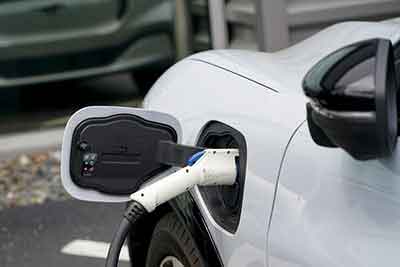Date: 07/02/2023
Relevance: GS-3: Indian Economy and issues relating to Planning, Mobilization of Resources; Government Budgeting; Environment Conservation, Environmental Pollution, Net-zero Commitment.
Key Phrases: Union Budget, Fiscal Policy, Research and Development, Battery Energy Storage System, Electrical Vehicles, Environment, COP26 , Saptarishi, Panchamrita, Net-zero emission, Li-ion Battery, Solar Energy, Wind Energy, UNFCCC, Amrit kaal.
Context:
- In the Budget 2023-24, the Govt proposed for the establishment of a viability gap funding mechanism to support the creation of battery energy storage systems with a capacity of 4,000 MWh.
- In a response to a recent query in the Rajya Sabha, Science Minister Jitendra Singh pointed out a key challenge faced by researchers investigating battery storage technologies in India is the sourcing of raw materials.
Key Highlights:
- With the country’s population set to overtake China’s this year, India’s appetite for energy to propel the economy is set to surge exponentially.
- Battery energy storage systems (BESS) are devices that enable energy from renewables, like solar and wind, to be stored and then released when customers need power most.
- Lithium-ion batteries, which are used in mobile phones and electric cars, are currently the dominant storage technology for large scale plants to help electricity grids ensure a reliable supply of renewable energy.
Need for Battery Energy Storage system in India:
- Use in the Electrical Vehicles
- Battery storage systems are critical to electric vehicles as well as for consistently supplying solar and wind power to the electric grid.
- In India, the electric vehicle (EV) revolution is poised to take off
and almost every major automobile company rolls out new EV models to tap
the demand of electric vehicles.
- Therefore, the availability of indigenously produced lithium-ion batteries has become a necessity, especially to lower the cost of EVs.
- Use in the alternative Source of Power Generation
- Battery storage technology has a key part to play in ensuring homes and businesses can be powered by green energy, even when the sun isn’t shining or the wind has stopped blowing.
- These are crucial in power grid stabilization and essential as India increases its reliance on alternative sources of power generation including solar and wind.
- Having a battery system integrated with a solar power plant will
mean that the dependency on coal can be reduced and more renewable
energy can be supplied to homes and establishments.
- With wind turbine farms and solar photovoltaic projects characteristically producers of variable electric supply, battery storage systems become enablers of ensuring the electricity these generators produce at their peak output is stored and then supplied to match the demand arriving at the grid from household or industrial consumers.
Issues with the Battery Storage Research:
- There is no domestic manufacturing of Li-ion batteries at present and the majority of the demand is catered through imports.
- The important raw material resources required, such as lithium and cobalt, are scarce and need to be imported.
- There is no established supply chain for electrode materials and components in India.
Green Energy
About
- Green energy is any energy type that is generated from natural resources, such as sunlight, wind or water.
- Green energy sources are usually naturally replenished, as opposed to fossil fuel sources like natural gas or coal, which can take millions of years to develop.
- Green sources also often avoid mining or drilling operations that can be damaging to ecosystems.
Types:
- Solar Energy
- Wind Energy
- Hydro Energy
- Geothermal Energy
- Biomass
- Biofuel
Supporting the Battery Research in India:
- The Department of Science & Technology and the Science & Engineering
Research Board have supported approximately 75 research and
development-related projects in the area of battery storage.
- It has resulted in several publications and lab level prototypes.
- Apart from this, two battery recycling technology research projects
were also being supported.
- The Central Electro-Chemical Research Institute (a lab under
the Council of Scientific and Industrial Research) has established a
small-scale (1000 cells per day) Li-ion cell manufacturing line at its
Chennai unit.
- This unit has been given to a start-up company to enable local manufacturing of lithium-ion batteries.
- The Solar Energy Corporation of India Limited (a public sector
body under the Ministry of New and Renewable Energy) issued a tender
for setting up 500 MW/1000 MWh Standalone Battery Energy Storage
Systems (BESS).
- It is a first-of-its-kind tender in the country which aims to provide power distribution companies with storage facilities to be used on an “on-demand” basis.
- The Central Electro-Chemical Research Institute (a lab under
the Council of Scientific and Industrial Research) has established a
small-scale (1000 cells per day) Li-ion cell manufacturing line at its
Chennai unit.
Way Forward:
- Battery storage technologies are essential to speeding up the replacement of fossil fuels with renewable energy.
- Battery storage systems will play an increasingly pivotal role between green energy supplies and responding to electricity demands.
- Storage of renewable energy requires low-cost technologies that have long lives – charging and discharging thousands of times – are safe and can store enough energy cost effectively to match demand
Conclusion:
- As part of ‘Panchamrit’ goal, India aims to reach a target of 500 GW
of renewable energy capacity by 2030.
- Achievement of this goal will depend on the success of the solar-BESS system.
Source: The Hindu
Mains Question:
Q. What are major issues in the research of battery energy storage systems in India. Also, highlights the work done by the government to support the research. (150 Words).






















